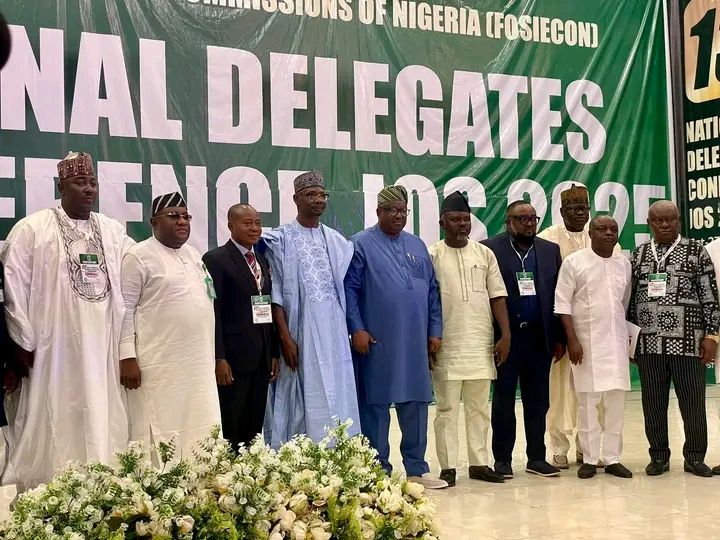From Tongnaan Bawa, Jos
A Former Resident Electoral Commissioner, INEC Benue State has said the manner which local government elections in Nigeria are being manipulated, often lacking credibility, fairness, and competitiveness.
Professor Egwu in a keynote address at the 13th Annual Conference of the Forum of State Independent Electoral Commissions, FOSIECON which is ongoing in Jos, Plateau State, said lack of credibility have been seen as a step towards the weakening of democracy.
He critically examined the state of local government elections in Nigeria, highlighting challenges, lessons, and reform opportunities for the State Independent Electoral Commissions (SIECs).
Professor Samuel Egwu who is also of the Department of Political Science, University of Jos praised FOSIECON for its commitment to strengthening democratic institutions at the local level and called for reforms to enhance SIECs’ autonomy and effectiveness.
He stated, “Democracy is weakening globally, with increasing authoritarian pushback. In Nigeria, this trend is visible in how local government elections are manipulated, often lacking credibility, fairness, and competitiveness.
“Since Nigeria’s return to democracy in 1999, local elections have faced serious flaws. Ruling parties dominate all 36 States, many States delay or avoid elections, appointing caretaker committees instead, electoral fraud is widespread.
“Local elections in many States reflect “electoral authoritarianism”, elections manipulated to maintain control, giving only an illusion of democracy.”
He noted that the problem lies not just in SIECs but in Nigeria’s political culture and elite-driven politics, where power and state resources are captured at all levels.
He called for “Constitutional reform to define the tenure of local councils, operational and financial autonomy for SIECs, independent appointment processes, stronger legal framework and oversight, and de-centralized training and capacity building for SIECs via FOSIECON.”
While it has been advocated for INEC to take over local elections, Egwu argues that doing so undermines Nigeria’s federal structure. Instead, reforming SIECs within the federal framework is more appropriate.
Egwu rejected simplistic comparisons between INEC and SIECs, instead calling for comprehensive reforms and greater citizen agency to ensure that local elections serve their democratic and developmental purposes.
However, the Governors of Plateau and Nasarawa States, Caleb Mutfwang and Engr. Abdullahi Sule respectively asked that the right things be done so that institutions can work.
Mutfwang who declared the event open disclosedthat, “A lot has been said about the role of state electoral commissions in our democratic journey. Professor Samuel made an important point when he spoke about institutional inefficiencies. In truth, all of it comes down to one thing, leadership.
“If leaders choose to do the right thing, institutions will work. The conversation should start with leadership recruitment, how we select those who govern us. Elections shouldn’t just be about ticking boxes. When you spend billions on an election and the result doesn’t reflect the will of the people, it’s just a waste of resources.
Also, the collaboration between INEC and the state electoral commissions must improve. The voter data INEC holds doesn’t belong to INEC—it belongs to Nigeria. States should have access to it, without unnecessary restrictions.”
Governor Sule who was the Guest Speaker added, “Looking at the objectives of this conference, I was glad to see the emphasis on reaffirming the electoral responsibilities of State Independent Electoral Commissions. You’re here to x-ray the challenges you face and examine the need for electoral reforms and that is very important.
“The Chairman of the Forum mentioned that State Independent Electoral Commissions are often misunderstood, disregarded, criticized, and even hated. And I agree. In many cases, they are not trusted. But is that entirely their fault? From my experience, I can say no, it’s not.
“Everybody wants control. But control doesn’t build democracy. Control doesn’t bring development. What we need are leaders who fear God, who have a vision, and who are willing to serve the people. Once that is in place, Nigerians won’t care who controls what, they’ll care that the system works.
“But abolishing State Electoral Commissions is not the answer. I strongly disagree with that idea. It’s not a solution. The same problems you see in the state commissions exist at the federal level too. So if you scrap the state commissions, you’re not solving the root problem, you’re just moving it around.”
Earlier, the National Chairman of FOSIECON, Barr. Jossy Eze noted that SIECs are probably one of the most misunderstood, disregarded, criticized or taunted among other Government agencies but FOSIECON is out to promote efficient election administration in SIECs and entrench international best practices in Local Government Council Elections.
“FOSIECON is grateful to all the State Governors who had religiously enabled their SIECs to conduct elections and hereby appeal to them through the Governor’s Forum, to support FOSIECON, strengthen and empower SIECs to achieve free, fair and credible Local Government elections,” he stated.
The Chairman, Plateau State Independent Electoral Commission Hon. Plangji Daniel Cishak who is the Host, while welcoming his colleagues to Jos noted that the conference aims to provide a platform for dialogue on the future of grassroots elections, institutional reforms, and the role of SIECs in deepening democracy at the local level.
“This theme is not only timely but critical,” Mr. Cishak stated. “It encourages reflection, constructive debate, and actionable outcomes, especially at a time when the credibility of local government elections is under increasing scrutiny
He added that conference will offer an opportunity for peer review, examination of challenges, and sharing of innovations to strengthen local governance through credible elections.


